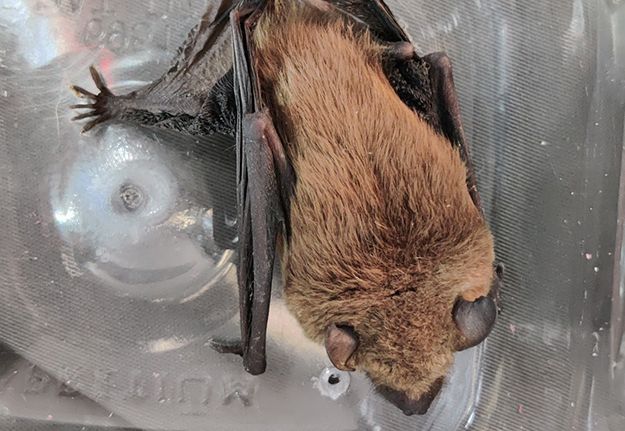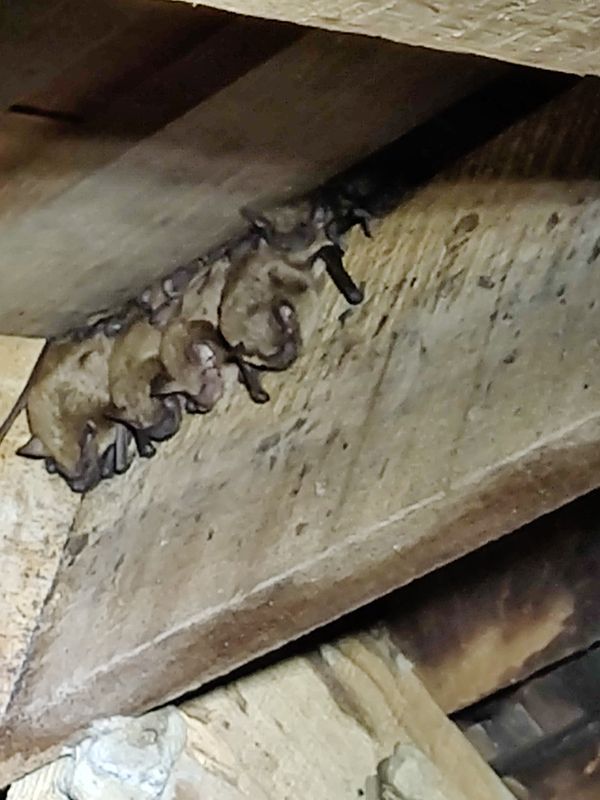Bat Management Services
Humane Eviction and Exclusion
Certified by NWCOA
Three-Year Warranty on All Exclusion Work
Hours:
Request a Quote
Hero Request Form
Thank you for contacting us.
We will get back to you as soon as possible
Please try again later
About Big Brown Bats
Eptesicus Fuscus (Bats)
Perhaps the most misunderstood animals we work with are bats. However, bats are vital to our ecosystem and play an invaluable role in pest control and agriculture! Bats are seasonal in their activity and can eat up to their weight in insects in one evening, making them wonderful to have around on summer evenings!
Nesting and Mating
There are ten different species of bat found in Ohio, however, the bat found most often in structures is the big brown bat. They are found in all rural and urban locations. Bats are most active once temperatures have reached 50+ degrees Fahrenheit consistently. A bat may roost or rest on your home under overhangs or on the side of your stucco or wood siding. Big brown bats may also find gaps in soffits, cracks in siding, and open vents in your home to utilize ready-made cavities. Points of entry that are common for bats are chimneys without caps, gaps at and around chimneys, and houses where the chimney pulls away. Brown bats will also utilize soffit gaps, shingle and soffit junctures, and vents without good screening behind them. A bat needs only a tiny 3/8 inch-sized hole to access a structure!
A good indicator of bat activity is small Tic-Tac-sized droppings that may be found on the ground under a vent that is being used or on the siding near the entry point. Bat guano is identified as shiny with succinct ends. The shiny portions of the dropping are the insect carapace that is not digested.
Big brown bats will have a winter and a summer den unless they use the cavity found over winter, which is called winter hibernacula. Mating begins in September, but the female bat will exhibit delayed fertilization. This means that she will induce pregnancy in the spring once temperatures break and they are flighted. Gestation is anywhere from 50-60 days. The young are called pups and are born late in May to June. Pups will stay with the mother for four to five weeks until they're able to fly and forage on their own. Bats have only one pup at a time but have been known to have twins.
Behavior and Illness
Bats are most active from dusk to dawn. If you see a bat on the ground, it may be injured or sick. If you think you have a sick or injured animal, you can contact a local wildlife rehabilitation center or individual. TLC Wildlife Management can assist you with collecting and securing the bat for transport. We can also offer local rehabilitator resources. If you have a bat in your living space, TLC Wildlife Management can help capture and release the bat back outside.

A big brown bat collected out of an office building to be released.
Bat Management FAQ
Have a bat-related question? We have the answer. Check out these FAQs and give us a call today for more information!
-
Can I shoot them?
No! It is illegal to knowingly harm, maim, or kill a bat. Bats are protected and can only be evicted from a structure if a thorough attic inspection is performed and bat watches are done when applicable. Bat watches would need to occur if there are more than 15 bats found during the inspection. The concern here is that bats with numbers more than 15 are likely to be in a historical bat colony or maternal colony, and young bats or pups may not be flighted if the eviction and exclusion process takes place. This would leave the pups behind to perish in the cavity in question.
As bats are federally protected, we adhere to all regulations relating to the eviction or relocation of bats in Ohio. There are regulations as to the time of year services can be performed, but rest assured that TLC Wildlife Management can assist you with developing a plan and helping you and your family keep your distance!
-
Why not just trap them and remove them?
Big brown bats are unique in that they are imprinted on the home and can use their echolocation and homing senses to immediately return to that area. Therefore, no matter where you release a trapped bat, it will return to its “home” location. In these situations, the problem is not the bats but the lack of integrity of the structure they are using. Trapping and removing bats may leave unflighted offspring to perish, causing a bigger problem in what is usually a difficult-to-access area. The only long-term solution for bats is eviction and permanent exclusion materials placed in vulnerable areas of the structure.
How Can TLC Wildlife Management Help?
TLC Wildlife Management utilizes ONLY humane techniques for the eviction of bats. We use the behavior and biology of the bat to allow the animal to evict without harm. Points of access commonly found are at shingle and soffit junctures, at soffits near downspouts, open un-capped chimneys, attic vents, roof vents, and ridge vents. We begin by performing a thorough inspection to identify all possible points of access.
TLC Wildlife Management then installs custom materials to close off possible areas of entry. Once we have secured the structure, we install temporary one-way doors at the points of entry, which allows the bats to exit, but not re-enter (assuming we have closed off all other possible entry points).
After a set length of time to ensure that all of the bats have moved on, we will return to remove the doors and place the final eviction materials. This ensures not only that the bats have left the structure, but that there is a much smaller chance that they will return as there is no longer easy access to shelter. Call today or request a quote to schedule an evaluation of the interior and exterior of your home or business. TLC Wildlife Management will provide detailed photos and education about your specific situation and help create a custom solution to help you co-exist with these important and fascinating wild neighbors.
Certified by ODNR and Bat Standards Compliant
We identify and address the root of the problem.
"TLC Wildlife Management was excellent at assessing the interior and exterior of my home then reviewing all the information with me to formulate a plan. Adam was very though, efficient, and responsive to answering my questions! Thank you for scheduling so quickly as well!!"
- Sarah C.
Big brown bats are mammals and feed their young milk until fully flighted.
A temporary one-way door installed to allow for the bat's eviction before closing off for good.
A big brown bat found inside an attic roosting.
Bats are colony animals and many can be found during an attic inspection
A large pile of guano.
serving area
Central Ohio
Columbus, OH
Dublin, OH
Delaware, OH
Marysville, OH
and surrounding areas
Business Hours
- Mon - Fri
- -
- Saturday
- -
- Sunday
- -
After-Hours Appointments









Share On: